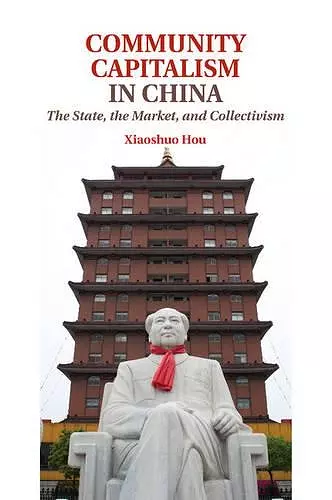Community Capitalism in China
The State, the Market, and Collectivism
Format:Paperback
Publisher:Cambridge University Press
Published:26th Jun '14
Currently unavailable, and unfortunately no date known when it will be back

Hou offers a 'both/and' perspective of the state, market, capitalism and communism by examining the local institutional innovation in China.
Hou offers the 'both/and' perspective and discusses the intertwining of the economy, the state and social relations. Focusing on three villages in China - Nanjie, Huaxi and Shangyuan - with collectively owned enterprises, villagers become shareholders in these enterprises and receive social welfare benefits and/or dividends.Hou proposes to end the dichotomous view of the state and the market, and capitalism and communism, by examining the local institutional innovation in three villages in China and presents community capitalism as an alternative to the neoliberal model of development. Community is both the unit of redistribution and the entity that mobilizes resources to compete in the market; collectivism creates the boundary that sets the community apart from the outside and justifies and sustains the model. Community capitalism differs from Mao-era collectivism, when individual interests were buried in the name of collective interests and market competition was not a concern. This book demonstrates the embeddedness of the market in community, showing how social relations, group solidarity, power, honor, and other values play an important role in these villages' social and economic organization.
'Community Capitalism in China is a welcome addition to the body of research on economic reform in China. It is a beautiful example of the ways in which grounded research can both illuminate eye-opening stories about transforming economies and also advance our theoretical understanding of the forces driving that transformation. Professor Hou also boldly steps beyond the tired state-versus-market mindset, offering a fresh view of how China's economy works.' Doug Guthrie, George Washington University School of Business
'The decollectivization of agriculture is constantly trumpeted as a key to China's economic growth under the reforms. Nevertheless, many of today's richest villages have actually retained or recreated collective forms of ownership. Professor Hou untangles this puzzle with an insightful and revealing analysis of how 'community capitalism' can allow a collective economy to thrive in contemporary China and in the world market.' Robert P. Weller, Boston University
'This volume is a well-supported case study of China's 'transitory economy'. By carefully analyzing three highly industrialized villages in China, Dr Hou's well-articulated argument offers a radically original concept that contributes significantly to the understanding of the complexity and reality of Chinese society in the post-Mao era.' Xiao-huang Yin, Occidental College
'Based on extensive fieldwork in three Chinese villages, Xiaoshuo Hou shows how local party leaders and villagers successfully promoted economic development and raised living standards during the era of reform.' Robert K. Schaffer, Pacific Affairs
'… a rich and comprehensive study of an original path of development introduced by some small-size communities in rural China in order to adapt to the new rules of state-controlled capitalism and the privatization of social welfare benefits.' Thomas Boutonnet, The China Journal
ISBN: 9781107448780
Dimensions: 230mm x 153mm x 10mm
Weight: 260g
168 pages